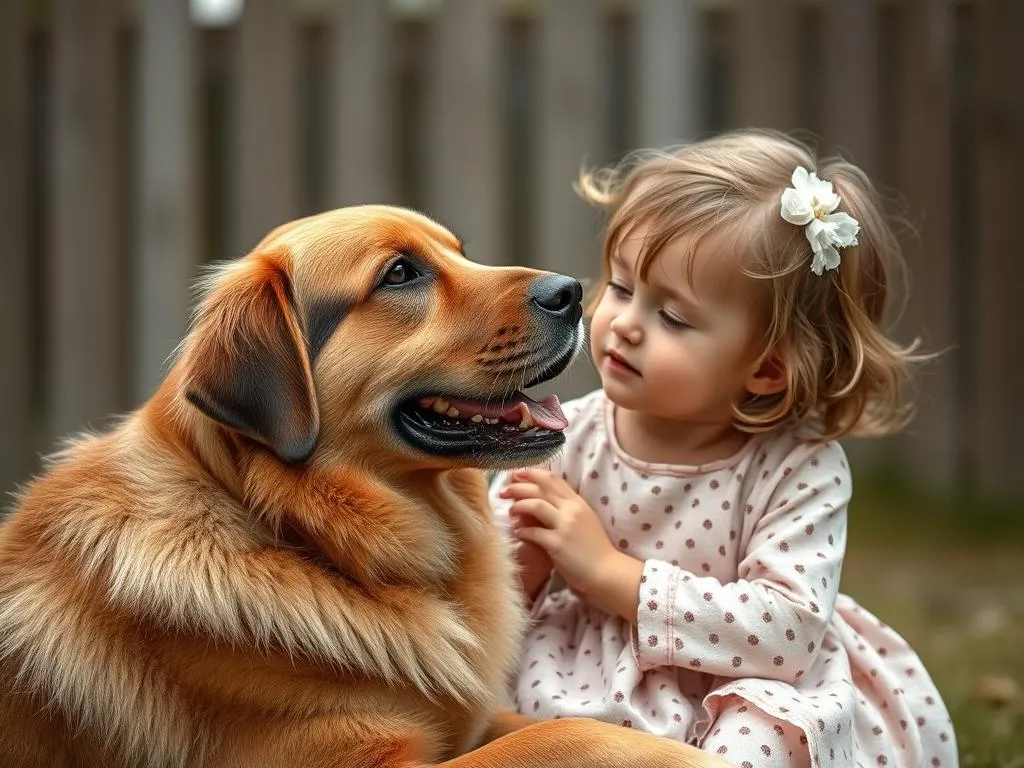
Introduction
Dog health care is essential for ensuring the well-being of our furry friends, but it also plays a significant role in the lives of children who grow up with them. The concept of dogs and children growing up together is more than just a heartwarming image; it encompasses a range of benefits for both parties that can shape their emotional, social, and physical development.
As dogs become integral members of the family, understanding their health care is crucial, not just for the dogs themselves but also in fostering a nurturing environment for children. In this post, we will explore the myriad benefits that arise when dogs and children share their formative years, highlighting the positive outcomes for both.
The Bond Between Dogs and Children
Understanding the Relationship
The relationship between dogs and children is built on companionship, trust, and love. Dogs have an innate ability to sense human emotions, which allows them to connect deeply with children. This emotional connection can significantly impact a child’s development. Studies show that children who interact with dogs often exhibit greater emotional intelligence, which includes recognizing and responding to feelings in themselves and others.
Moreover, the presence of a dog can provide children with a sense of security and comfort. This bond encourages children to express their feelings more openly and develop a healthy emotional vocabulary. The benefits of dogs and children growing up together are not just anecdotal but are supported by developmental research.
Social Skills and Emotional Growth
Growing up with dogs can foster essential social skills in children. Engaging with a pet teaches empathy as children learn to understand and respond to the needs of their canine companions. This emotional growth is crucial, as it lays the foundation for healthy relationships with peers and adults.
Additionally, caring for a dog instills a sense of responsibility in children. From feeding and grooming to training and walking, the tasks involved in dog care help children learn accountability. These lessons in responsibility often translate into other areas of their lives, including schoolwork and interpersonal relationships.
Health Benefits for Children
Physical Health Benefits
Having a dog in the family can lead to significant physical health benefits for children. Exposure to dogs and the germs they bring can help children develop stronger immune systems. Research indicates that children who grow up with pets, particularly dogs, are less likely to suffer from allergies and asthma compared to those who don’t.
Moreover, dogs encourage physical activity. The playful nature of dogs motivates children to engage in outdoor activities, whether it’s playing fetch, going for walks, or running around in the yard. This increased physical activity is crucial for combating childhood obesity and fostering a lifelong appreciation for exercise.
Mental Health Benefits
The mental health benefits of dogs and children growing up together are equally compelling. Dogs can serve as emotional support, providing companionship that can alleviate feelings of loneliness and anxiety. Interacting with a dog has been shown to release oxytocin, the “love hormone,” in both children and dogs, promoting feelings of happiness and reducing stress.
Additionally, the routine of caring for a dog can provide children with a sense of purpose and stability. This consistent responsibility can lead to improved self-esteem and a greater sense of belonging, which are vital for overall mental health.
Health Benefits for Dogs
Physical Health Benefits
Dogs also benefit greatly from growing up with children. Regular exercise is crucial for a dog’s health, and children often provide that through play. Engaging in physical activities such as walking, running, and playing fetch helps keep dogs fit and healthy, reducing the risk of obesity and associated health issues.
Moreover, establishing a consistent routine for feeding and exercise fosters a healthy lifestyle for dogs. Children can learn to assist with these routines, which encourages them to take an active role in their pet’s health care and well-being.
Socialization and Behavioral Health
The health benefits of dogs extend beyond physical fitness. Growing up with children can help dogs socialize effectively, which is vital for their behavioral health. Children can introduce dogs to new experiences, people, and environments, helping them become well-adjusted pets.
A nurturing environment, where children are taught to treat dogs with kindness and respect, can significantly reduce anxiety in dogs. This positive interaction can prevent behavioral issues, such as aggression or fearfulness, leading to a more harmonious household.
Best Practices for Integrating Dogs and Children
Choosing the Right Dog
Selecting the right breed is crucial when considering dogs and children growing up together. Factors to consider include breed temperament, size, and energy level. Breeds known for their gentle disposition, such as Golden Retrievers or Labradors, often make excellent family pets. It’s essential to choose a dog that can handle the exuberance of children while being patient and loving.
Additionally, assessing the energy level of your family is vital. Active families may benefit from high-energy breeds that can keep up with the children’s activity level, while more laid-back families might prefer calmer breeds.
Training and Socialization
Training is a critical component in creating a harmonious relationship between dogs and children. Basic obedience training ensures that dogs understand commands and appropriate behaviors, which can prevent potential issues during interactions with children.
Positive reinforcement training methods are recommended, as they focus on rewarding good behavior rather than punishing mistakes. Resources such as dog training classes or professional trainers can provide valuable guidance in this area.
Health Care Essentials
Regular veterinary check-ups and vaccinations are essential for maintaining your dog’s health. A consistent health care routine not only protects the dog but also ensures a safe environment for children. Keeping up with vaccinations, flea and tick prevention, and annual check-ups is vital.
Nutrition is another critical aspect of dog health care. Children can learn about proper nutrition by helping to prepare their dog’s meals and understanding the importance of a balanced diet. Exercise guidelines should also be established, ensuring that both dogs and children have the opportunity to stay active together.
Safety Considerations
Understanding Dog Behavior
Educating children about dog behavior is essential for safe interactions. Teaching children to recognize dog body language—such as signs of stress or discomfort—can help prevent accidents. For example, children should be taught to approach dogs calmly and to avoid startling them, especially when they are eating or resting.
Emergency Preparedness
It’s crucial to be prepared for potential dog-related incidents. Teaching basic first aid for dog bites or scratches can empower children to respond appropriately in case of an emergency. Furthermore, creating a safe environment by supervising interactions between dogs and children can minimize risks.
Case Studies and Testimonials
Real-Life Examples
Many families have shared their positive experiences with dogs and children growing up together. For instance, one family reported that their children learned invaluable lessons about compassion and empathy through their interactions with their Labrador. The dog provided a sense of companionship that helped the children navigate their emotions during challenging times.
Similarly, a child psychologist noted that children who grow up with dogs often demonstrate better social skills in school settings. The nurturing bond they develop with their pets translates into more profound relationships with peers.
Expert Opinions
Veterinarians and child development specialists agree on the myriad benefits of having dogs in a child’s life. A veterinarian stated, “The presence of a dog can significantly enhance a child’s emotional and physical well-being. The lessons they learn through caring for a pet are invaluable.” Child development specialists echo these sentiments, emphasizing the role that pets play in teaching responsibility and empathy.
Conclusion
The benefits of dogs and children growing up together are profound and multi-faceted, enriching the lives of both. From fostering emotional connections to promoting physical health, the bond shared between dogs and children is nothing short of extraordinary. By understanding and prioritizing proper dog health care, families can nurture this relationship, ensuring a harmonious and fulfilling environment for everyone involved.
With the right approaches to dog selection, training, and health care, families can enjoy the countless rewards that come from sharing their lives with a dog. Embracing these practices will not only enhance the well-being of dogs but also foster a generation of empathetic and responsible children.









